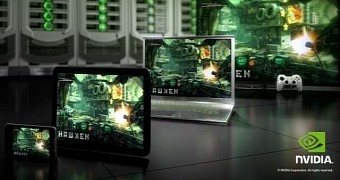Streaming AAA games is the kind of thing that sounds great in theory but usually ends up as a very disappointing experience.
Streaming gameplay from high-end games over the Internet is something that many companies have tried to make possible, but there are several significant hurdles to overcome before anything like that can reach mass appeal.
The most glaring issue is usually the quality of the Internet connection required in order to enjoy a smooth gameplay experience, with no input lag and framerate drops, making it a viable alternative to buying specialized hardware.
OnLive, the biggest player on the market, has just announced that it will be shutting down its operations at the end of April, after having being purchased by Sony. This, however, may not be the final nail in the concept's coffin.
Sony acquired all the cloud gaming patents and technology that OnLive developed and utilized over a period of five years, in a move similar to the one from 2012, when it had acquired Gaikai, OnLive's main competitor.
It later turned out that Sony used the technology for its own PlayStation Now service, and the recent acquisition of OnLive may point to the Japanese corporation being intent on expanding and perfecting its business.
The best bet lies with the big players
Sony offers its customers the option to stream a pretty big library of older PSOne, PS2 and PS3 games on their PlayStation 4 computer entertainment system, enabling a backward compatibility of sorts, which may prove to be yet another selling point in its favor.
For the time being, Microsoft has not announced anything of the sort, but it's likely that the company will use its extensive experience with Azure technology to provide gaming-related services.
The company has already mentioned that games will feature cross-play capability across the PC and Xbox One, as long as you're using Windows 10, and has pledged to solidify its ecosystem and allow people to enjoy a smoother experience.
Titanfall, Respawn Entertainment's Xbox and PC exclusive competitive first-person shooter, is already making extensive use of the Azure infrastructure for delivering AI computations in order to enhance the experience of online gamers, so it's not that big of a leap to make.
In fact, several industry analysts have already predicted that Microsoft will offer some sort of cloud gaming service sometime in the future, mainly due to the fact that Redmond is hard at work developing DeLorean, a system meant to solve some of the latency and control delays associated with cloud gaming.
The increasing prevalence of cloud-gaming capable devices, including PlayStation 4, Xbox One, PC and tablets, paints a rosy picture regarding the future of cloud gaming.
Nvidia, the leading manufacturer of high horsepower video cards, is already offering a series of demanding PC games on its new Shield tablets, running Android, making use of its own cloud service, Grid.
The key to making cloud gaming work is to make it indispensable
The fact that pretty much all the major players in the gaming hardware market are experimenting with this is a good sign, but it doesn't solve one of the key problems of the system. Streaming gameplay from the cloud is basically offering a solution to a problem nobody currently has.
As many people are already opining that the Xbox One and PlayStation 4, together with the Nintendo NX, will probably be the last console generation to use the current model, things might change five years from now.
But for the time being, everyone who is serious about gaming already owns capable dedicated hardware. Today's consoles already run dated hardware, which is likely to speed up the process, but the reality is that we don't need cloud gaming for now.
The only way to really push it is to tie it into so many aspects of gaming that it slowly becomes indispensable to most AAA experiences, thus facilitating the transition to seeing games like services, or at least consumable products, and less like physical merchandise.
One way I can see this happening would be for a cloud gaming service to enable me to play platform-exclusive video games. I would find that very appealing, as I want to play Bloodborne, but I don't plan on getting a PlayStation 4 console anytime soon.
The big problem with this is that exclusive games drive hardware sales, and Microsoft and Sony take a sizable chunk out of every game sold on their home consoles, which is one of the reasons they sell them so cheap, with a rather tiny profit margin.
The industry as a whole needs to evolve beyond proprietary hardware in order for platform holders to be willing to part with the money they earn from each and every game sold on their consoles, just on the off-chance that gamers will give them some money from time to time in order to try out the exclusives.

 14 DAY TRIAL //
14 DAY TRIAL //